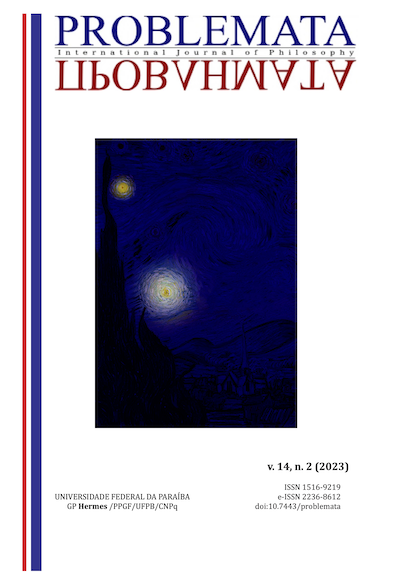FROM BOILEAU TO BECKETT:
REFLECTIONS OF THE SUBLIME IN DRAMATURGY
DOI:
https://doi.org/10.7443/problemata.v14i2.67876Keywords:
Sublime, Dramaturgy, Boileau, BeckettAbstract
This article proposes to examine the issue of the sublime in dramaturgy from reflections ranging from Boileau to Beckett. Following this route, it becomes possible to debate around the sublime not only around poetry, as an artistic work, but also to consider the field of human sensitivity. In this sense, it is possible to consider the sublime not only as a rhetorical incapacity in the face of incommensurability, but, above all, to treat it in the scenario of anguish in the face of the impossibility of saying something.
Downloads
References
ADDISON, Joseph. Critical Essay from The Spectator. Oxford: Clarendon Press, 1970.
ADORNO, Theodor W. Dialética Negativa. Tradução de Marco Antonio Casanova. Rio de Janeiro: Jorge Zahar, 2009.
ADORNO, Theodor W. Notas sobre Literatura III. Tradução de Celeste Ainda Galeão. Rio de Janeiro: Tempo Brasileiro, 1973.
ADORNO, Theodor W. Teoria Estética. Tradução de Artur Morão. Lisboa: Edições 70, 2011.
ADORNO, Theodor W. Gesammelte Schriften 11. Noten zur Literatur. Frankfurt am Main: Suhrkamp, 2015.
BENJAMIN, Walter. Ensaios reunidos: Escritos sobre Goethe. Tradução de Monica Krausz Bornebusch, Irene Avon e Sidney Camargo. São Paulo: Ed. 34, 2009.
BECKETT, Samuel. Esperando Godot. Tradução de Fábio de Souza Andrade. São Paulo: Cosac & Naify, 2005.
BOILEAU, Nicholas. Oeuvres complètes. Tome troisième. Paris: Garnier Frères, 1873.
BURKE, Edmund. Uma investigação filosófica sobre a origem de nossas ideias do sublime e do belo. Tradução de Enid Abreu Dobránsky. Campinas: Papirus, 1993.
DORAN, Robert. The theory of sublime from Longinus to Kant. Cambridge: University of Cambridge Press, 2015.
ESSLIN, Martin. Teatro do absurdo. Tradução de Barbara Heliodora. Rio de Janeiro: Jorge Zahar, 1968.
GOETHE, Johann Wolfgang von. Afinidades eletivas. Tradução de Erlon José Pascoal. São Paulo: Nova Alexandria, 2008.
HEGEL, Georg Friedrich Wilhelm. Cursos de estética I. Tradução de Marco Aurélio Werle. São Paulo: Edusp, 2001.
HÖLDERLIN, Friedrich. Fragmentos de poética e estética. Tradução de Ulysses Vaccari Razzante. São Paulo: EDUSP, 2021.
KANT, Immanuel. Crítica da Faculdade de Julgar. Tradução de Fernando Costa Mattos. Petrópolis: Vozes; Bragança Paulista: Ed. Universitária São Francisco, 2016.
LACOUE-LABARTHE, Philippe. Méthaphrasis, suivi de Le théâtre de Hölderlin. Paris: PUF, 1998.
LACOUE-LABARTHE, Philippe. A imitação dos modernos: ensaios sobre arte e filosofia. Tradução de Joao Camillo Penna et alli. São Paulo: Paz e Terra, 2000.
LITMAN, Théodore. Le Sublime em france (1660-1714). Paris: A.G. Nizet, 1971.
LYOTARD, Jean-François. L’inhumain. Causeries sur le temps. Paris: Galilée, 1988.
LYOTARD, Jean-François. Lições sobre a analítica do sublime. Tradução de Constança Mendonça Cesar e Lucy Moreira Cesar. Campinas: Papirus, 1993.
MACHADO, Roberto. Nascimento do trágico: de Schiller a Nietzsche. Rio de Janeiro: Jorge Zahar, 2006.
MONK, Samuel H. The Sublime: A Study of Critical Theories in XVIII-Century England. New York: Modern Language Association of America, 1935.
MENNINGHAUS, Winfried. Das Ausdruckslose: Walter Benjamin Kritik des Schönen durch das Erhabene In: STEINER, Uwe (org.). Walter Benjamin 1892-1940. Zum 100. Geburtstag. Berna: Peter Lang, 1992, p. 33-76.
SCHILLER, Friedrich. Do sublime ao trágico. Tradução de Pedro Süssekind. Belo Horizonte: Autêntica, 2011.
SZONDI, Peter. Ensaio sobre o trágico. Tradução de Pedro Süssekind. Rio de Janeiro: Jorge Zahar, 2001.
Downloads
Published
Issue
Section
License
Copyright (c) 2023 Theo Machado Fellows

This work is licensed under a Creative Commons Attribution 4.0 International License.
Authors who publish with this journal agree to the following terms:
- Authors retain copyright and grant the journal right of first publication with the work simultaneously licensed under a Creative Commons Attribution License that allows others to share the work with an acknowledgement of the work's authorship and initial publication in this journal.
- Authors are able to enter into separate, additional contractual arrangements for the non-exclusive distribution of the journal's published version of the work (e.g., post it to an institutional repository or publish it in a book), with an acknowledgement of its initial publication in this journal.
-
- Authors are permitted and encouraged to post their work online (e.g., in institutional repositories or on their website) prior to and during the submission process, as it can lead to productive exchanges, as well as earlier and greater citation of published work (See The Effect of Open Access).





